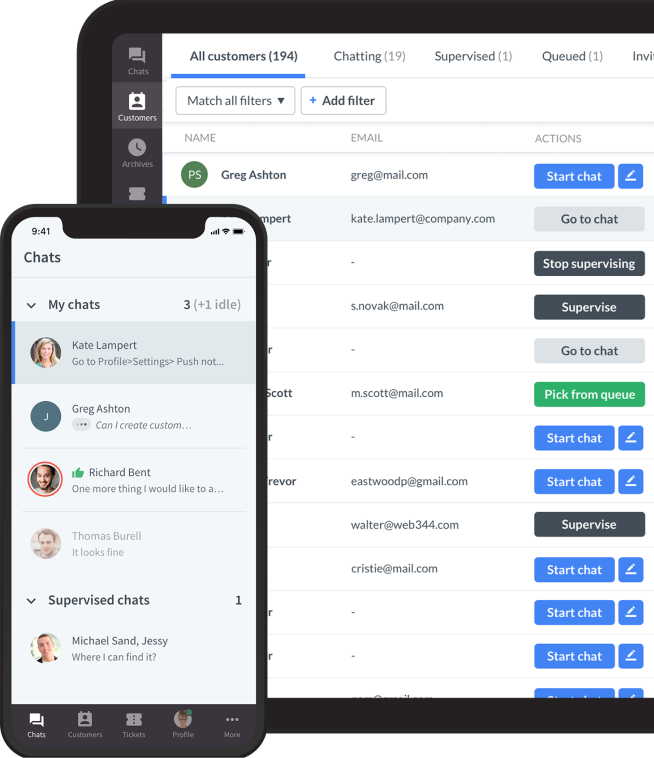Showing top 0 results 0 results found
Showing top 0 results 0 results found

In the fast-paced digital world, good customer service is more than just a nice-to-have; it's a crucial driver of business success. Imagine the impact when a customer's issue is resolved with a swift, personalized response—this not only enhances their day but boosts their loyalty to your brand.
On the flip side, consider the fallout from poor customer service: a tarnished reputation and the likelihood of customers flocking to competitors. This is where technology like LiveChat shines, offering a bridge between customer frustrations and the solutions they seek.
By integrating such technologies, businesses can transform challenges into opportunities to impress and engage. Let's explore why prioritizing customer service solutions not only keeps your clientele happy but also propels your business forward.
Why Solving Customer Service Problems is Crucial?
The implications of poor customer service are significant and can have a profound impact on a business's bottom line and reputation.
For instance, a report from Qualtrics XM Institute highlights that more than half (53%) of consumers have reduced their spending following a single bad experience with a company, and globally, businesses stand to lose a staggering $4.7 trillion in consumer spending due to poor customer experiences (Qualtrics).
Additionally, 85% of customers who have had poor service will avoid the company that provided it, with half stating they will never use the business again (ChannelReply). These statistics underscore the economic and reputational risks associated with poor customer service.
Here are the five reasons why you need an excellent customer service experience:
- Acquiring New Customers: It's well-known that it costs significantly more to acquire a new customer than to retain an existing one. By solving customer service problems efficiently, businesses can not only retain their customer base but also create a reputation that attracts new customers.
- Building Customer Loyalty: Providing solutions to customer service problems promptly and effectively boosts customer satisfaction. Customers who feel valued and understood are more likely to become repeat buyers and advocates for the brand.
- Enhancing Brand Reputation: Every customer interaction shapes the public perception of a brand. Efficiently addressing customer service problems helps in maintaining a positive brand image and can mitigate the damage from negative reviews and word-of-mouth.
- Increasing Employee Satisfaction: When customer service teams are equipped with the right tools and strategies to handle customer service problems, it reduces their stress and increases job satisfaction. Happy customer service reps provide better service, creating a positive feedback loop that benefits all stakeholders.
- Leveraging Customer Feedback: Resolving customer service issues gives businesses a unique opportunity to gather valuable feedback. This feedback can be instrumental in refining products and services, ultimately leading to innovation and improved customer satisfaction.
13 Common Customer Service Problems and Their Solutions
In the realm of customer service, every interaction counts. From the first greeting to the final resolution, each step either builds up your reputation or tears it down. In this section, we’ll explore 13 typical customer service challenges that can make or break your customer relationships.
We'll explore why these issues are problematic and offer practical solutions to turn potential frustrations into opportunities for excellence. Let’s start addressing these common hurdles and transform the way your team handles customer service.
1. Delayed Responses and Long Wait Times
Nothing tests a customer's patience quite like delayed responses and long wait times. This slow service often leads to customer dissatisfaction and can significantly increase churn rates as customers feel undervalued and overlooked.
What are the Reasons?
- Insufficient Staffing: Often, there are simply not enough customer service representatives to handle the volume of inquiries, leading to longer wait times.
- Inefficient Processes: Outdated or cumbersome service processes can slow down response times, causing delays in addressing customer concerns.
- Lack of Automation: Without automated systems to handle routine inquiries, staff can become overwhelmed, increasing the response time for more complex issues.
What is the Solution?
- Implement Advanced CRM Systems: Utilize customer relationship management (CRM) systems to manage and analyze customer interactions and data throughout the customer lifecycle.
- Staff Training and Adequate Scheduling: Ensure enough staff are available during peak times and train them to handle inquiries efficiently.
- Leverage LiveChat Features: Use LiveChat to engage customers immediately with pre-set messages or initiate chats with selected visitors as soon as they land on your site, enhancing response times and personal engagement.
2. Rude or Incompetent Staff
The impact of encountering rude or incompetent staff can be devastating for a business. Not only does it sour the customer's immediate experience, but it also harms the company's reputation long-term.
What are the Reasons?
- Staff Overwhelmed by Queries: During busy periods, the influx of customer inquiries can overload the staff, slowing response times and affecting service quality.
- Outdated Technology Delays: Older technology can cause delays in responding to customer queries, leading to a backlog and increasing customer frustration.
- Inefficient Workflow Management: Poor workflow management can cause disorganization within customer service teams, leading to inconsistent service and delays in resolving issues.
What is the Solution?
- Comprehensive Training Programs: Develop extensive training for customer service teams focusing on product knowledge, communication skills, and service etiquette.
- Regular Performance Reviews: Implement a system for monitoring performance and giving feedback to help staff improve their service delivery.
- Utilize LiveChat for Consistent Quality: Employ LiveChat to provide standardized responses and maintain a high quality of customer interaction, minimizing human error and ensuring a uniform service experience.
3. Poor Multi-channel Integration
When services are disjointed across communication platforms, it creates confusion and leads to customer dissatisfaction. Consistency is key in multi-channel integration.
What are the Reasons?
- Insufficient Training Issues: Lack of adequate training in customer service etiquette and product knowledge can lead to ineffective handling of customer inquiries, escalating customer service problems.
- High Stress and Burnout: Continuous high stress and burnout among staff can impair performance, negatively impacting their ability to resolve customer service issues efficiently.
- Inadequate Hiring Processes: Poor hiring criteria and insufficient evaluation processes can result in a team that lacks the necessary skills to effectively address and solve customer service problems.
What is the Solution?
- Unified Customer Service Platform: Adopt tools that consolidate all customer interactions into one platform, allowing seamless service across all points of contact.
- Omnichannel Customer Strategy: Develop a strategy that includes all channels, ensuring consistent messaging and service quality.
- Integrate LiveChat with Other Channels: Enhance your service capability by integrating LiveChat with other major communication platforms like WhatsApp Business, Messenger, and Apple Messages for Business, providing a cohesive experience regardless of how your customers choose to reach out.
4. Inadequate Access to Self-Service Options
Many customers today appreciate the ability to resolve their issues independently, using self-service options such as FAQs, forums, and knowledge bases.
However, when these tools are not comprehensive or easy to navigate, it leads to increased frustration. Customers may end up relying on direct contact with customer service teams, which can be less efficient and more costly for both the customer and the company.
What are the Reasons?
- Outdated Information: The Customer service agent faces challenges when information is not regularly updated, leading to the customer service problem due to outdated or incorrect data.
- Complex Interfaces: Non-intuitive and complex interfaces can frustrate customer service agents and customers alike, complicating the resolution of customer service issues.
- Inadequate Issue Coverage: A lack of comprehensive resources fails to address all customer issues, leading to gaps in support provided by customer service agents.
What is the Solution?
- Regular Updates and Maintenance: Ensure that all self-service resources are regularly updated with the latest information and solutions. This keeps the self-service portals effective and reliable.
- User-Friendly Design: Invest in designing an intuitive and easy-to-navigate interface for all self-service platforms. This could include clear categorization, a search function, and a mobile-friendly design.
- Expand Self-Service Options: Develop a comprehensive range of self-service tools, including interactive tutorials, step-by-step guides, and video support, to cover various customer needs and learning preferences.
5. Inconsistent Information
When customer service agents provide conflicting information, it directly impacts the trust and confidence customers have in a brand. Consistency is key to maintaining a reliable relationship with customers, ensuring they feel secure in the support they receive.
What are the Reasons?
- Training Gaps on Updates: Inadequate training on the latest updates and policies can hinder the ability to provide outstanding customer service, as agents may not be equipped with the necessary knowledge to effectively resolve customer service problems.
- Scattered Information: When information is dispersed across multiple platforms, it creates challenges in maintaining consistency, which is crucial for delivering outstanding customer service and resolving customer service problems efficiently.
- Frequent Changes Create Gaps: Regular policy or product updates can lead to communication gaps among customer service teams, complicating efforts to deliver consistent information and resolve customer service problems effectively.
What is the Solution?
- Centralized Knowledge Base: Implement a centralized platform where all updated policies, product details, and customer service protocols are stored and accessible to all agents.
- Regular Training and Updates: Conduct regular training sessions to ensure all customer service agents are up to date with the latest information and fully understand any recent changes in the company’s offerings or policies.
- Clear Communication Channels: Establish clear and effective internal communication channels to quickly disseminate updates and changes to all customer service agents, ensuring everyone has the same current information.
6. Lack of Proactivity in Customer Interaction
Failing to anticipate customer needs or address potential problems proactively can lead to negative experiences and missed opportunities for enhancing customer relationships and loyalty.
What are the Reasons?
- Reactive Service Focus: Prioritizing reactive over proactive service can hinder the ability to anticipate and resolve customer service problems before they escalate.
- Insufficient Customer Insights: A lack of understanding regarding customer behavior and preferences can impede the delivery of personalized service and proactive problem resolution.
- Technology Underutilization: Failing to use technology effectively to predict customer needs can lead to missed opportunities for enhancing customer service and preventing issues.
What is the Solution?
- Implement Predictive Analytics: Use data analytics to predict customer needs and potential issues based on their past interactions and behaviors.
- Customer Journey Mapping: Regularly map the customer journey to identify potential pain points and proactively address them before they affect the customer.
- Leverage LiveChat's AI Tools: Utilize tools like LiveChat’s AI Assist to reduce tedious tasks, reply more quickly, summarize chats efficiently, and offer instant reply suggestions based on accumulated knowledge sources. This not only speeds up the response time but also anticipates and addresses customer queries proactively, enhancing overall customer satisfaction.
7. Failure to Follow Up
When customers don't see their issues fully resolved, it can feel like they're being neglected. A lack of follow-up suggests a company's lack of commitment to customer satisfaction, leading to increased dissatisfaction and eroding trust in the brand.
What are the Reasons?
- Mismanagement Leads to Oversights: Team mismanagement can result in missed issues, escalating into poor customer experience due to unresolved problems and increased customer complaints.
- Ineffective Interaction Tracking: Without effective systems to track customer interactions, critical information can be lost, leading to poor customer experience and an accumulation of unresolved customer complaints.
- Staff Shortages Prevent Resolution: Insufficient staffing levels make it difficult to address and resolve customer issues promptly, contributing to a backlog of unresolved tickets and escalating customer complaints.
What is the Solution?
- Implement Robust CRM Systems: Use customer relationship management (CRM) systems to keep track of all customer interactions and ensure follow-ups are completed.
- Automated Follow-Up Messages: Set up automated messages that ensure customers receive updates about the status of their queries.
- Dedicated Follow-Up Teams: Establish a team specifically tasked with following up on customer issues, ensuring that every customer feels valued and their problems are taken seriously.
8. Limited Language Support
In today's global market, the ability to provide customer service in multiple languages is crucial for enhancing customer experiences. Businesses that lack multilingual support risk alienating a significant portion of their customer base, potentially leading to dissatisfied customers.
What are the Reasons?
- High Costs Limit Support: High implementation costs often deter businesses from providing multilingual support, which can lead to bad customer service when language barriers arise.
- Lack of Multilingual Staff: The absence of skilled multilingual staff can exacerbate customer service problems, failing to meet the linguistic needs of a diverse customer base.
- Underestimation of Language Diversity: Businesses that underestimate the language diversity of their customers often provide inadequate support, leading to bad customer service and increased customer service problems.
What is the Solution?
- Hire Multilingual Staff: Recruit customer service agents who are fluent in key languages relevant to your customer base.
- Use Translation Technology: Implement technology such as LiveChat that offers real-time translation features to help bridge the language gap.
- Outsource Language Services: Partner with third-party services that specialize in multilingual customer support to provide the necessary language services without the need for internal development.
9. Customer Gets Transferred from One Agent to Another
Being transferred multiple times can frustrate customers, making them feel undervalued and leading to a poor customer service experience. This often happens when customer service agents are unable to resolve issues quickly or lack the necessary information or authority.
What are the Reasons?
- Limited Agent Authority: Agents lacking necessary authority or resources often can't effectively resolve issues, leading to delays and dissatisfaction.
- Inadequate Training: Insufficient training restricts agents’ ability to resolve issues effectively, compounding customer frustrations.
- Departmental Miscommunication: Poor communication across departments frequently results in unnecessary transfers, complicating the resolution process.
What is the Solution?
- Empower Agents: Ensure that all customer service agents have the necessary authority and tools to handle most issues independently.
- Enhance Training Programs: Develop comprehensive training programs that equip agents with a broad range of skills and knowledge about the company’s products and services.
- Integrate Customer Service Platforms: Utilize a unified customer service platform like LiveChat that allows agents to access customer history and previous interactions in real-time, reducing the need to transfer calls.
10. Wrong Product or Service Offered
Offering the wrong product or service can easily sour customer experiences, reflecting negatively on your business's ability to meet customer expectations effectively. When customers receive something they didn't intend to purchase, it not only creates frustration but also diminishes trust in the brand.
What are the Reasons?
- Miscommunication: Misunderstandings during customer conversations can lead to wrong product recommendations or purchases.
- Lack of Product Knowledge: Customer service agents may not be fully versed in the product range, leading to incorrect advice or suggestions.
- System Errors: Technical issues or outdated product information in ordering systems can result in incorrect fulfillment.
What is the Solution?
- Enhance Agent Training: Provide comprehensive product training to ensure every customer service team member can offer accurate information and recommendations.
- Improve Communication Tools: Utilize advanced customer support tools that allow agents to verify customer choices and clarify details before finalizing orders.
- Integrate LiveChat with E-Commerce: Connect LiveChat with leading ecommerce platforms to provide real-time, accurate product recommendations directly in chat sessions, minimizing the risk of errors.
11. Over-Reliance on Automated Systems
While automation can streamline operations and improve efficiency, over-relying on it can frustrate customers, especially when their complex issues receive generic responses or remain unresolved.
What are the Reasons?
- Cost Efficiency: Businesses might prioritize automation to reduce staffing costs, affecting the quality of customer service.
- Scalability Challenges: Companies often implement automation to handle large volumes of interactions but may not balance it well with human touch.
- Technological Limitations: Automated systems, while useful, sometimes lack the nuanced understanding of human agents, leading to inadequate issue resolution.
What is the Solution?
- Balance Automation with Human Interaction: Ensure that there are easy options for customers to escalate their concerns to human agents when necessary.
- Regularly Review Automation Scripts: Update and refine automated responses regularly to align with current customer needs and scenarios.
- Feedback Loop: Implement a system where customer feedback directly influences the updates and changes in automated systems, ensuring high-quality customer service that meets user expectations effectively.
12. Inconsistent Customer Experience Across Channels
When interacting with a business, customers may use various channels such as social media, email, live chat, and phone calls. The inconsistency in service quality or information across these channels can lead to confusion and dissatisfaction.
This misalignment undermines the ability to exceed customer expectations and deliver great customer service.
What are the Reasons?
- Lack of Integrated Systems: Many businesses use different tools for each channel, leading to disjointed data and interactions. This prevents a unified view of customer interactions and can result in inconsistent responses.
- Varied Training Across Teams: If team training isn't consistent, the service quality can vary significantly from one channel to another. This inconsistency can confuse and frustrate customers, especially if they receive different information depending on the communication method.
- Poor Communication Between Departments: Without effective internal communication, information silos can develop. These silos hinder the ability to provide a seamless customer experience, as one department may not have the same information as another.
What is the Solution?
- Implement an Omnichannel Customer Support Platform: Use one of the best customer support tools that integrates all communication channels into a single platform. This ensures that all customer interactions are logged in one place, providing consistency and allowing representatives to provide informed, personalized service.
- Standardize Training Programs Across All Channels: Develop comprehensive training programs that cover all aspects of customer service across different mediums. Ensure that every team member is equipped to handle inquiries consistently, exceeding customer expectations regardless of the channel.
- Enhance Interdepartmental Communication: Establish regular meetings and use collaborative tools to ensure that all departments share critical customer information. This coordination will help eliminate inconsistencies and ensure that all parts of the business are aligned in delivering great customer service.
13. Failure to Capture Customer Feedback
Not capturing or adequately addressing customer feedback is a significant oversight that can hinder the enhancement of service quality.
Ignoring feedback from unhappy customers prevents a business from gaining essential insights that could help refine their services and solve recurring customer service problems.
What are the Reasons?
- Inadequate Feedback Mechanisms: Sometimes, businesses do not have effective systems in place to gather feedback, or the systems they do use are not user-friendly, discouraging customers from providing their insights.
- Lack of Priority for Feedback: Some businesses fail to prioritize feedback, seeing it as a low-impact activity rather than an opportunity to improve. This neglect can lead to unresolved issues and unhappy customers.
- Inefficient Feedback Analysis Processes: Collecting feedback is one step, but analyzing it effectively is another. Without a structured process to analyze and act on feedback, valuable insights are lost.
What is the Solution?
- Implement Robust Feedback Tools: Utilize one of the best customer support tools specifically designed for feedback collection and analysis. Ensure these tools are easily accessible across all customer touchpoints to encourage engagement and capture valuable insights.
- Create a Dedicated Feedback Team: Establish a team whose primary responsibility is to manage, analyze, and respond to customer feedback. This team should focus on turning feedback into actionable insights to continually exceed customer expectations.
- Regular Review and Adaptation of Practices: Set regular intervals to review customer feedback and adjust practices accordingly. This proactive approach ensures that the business evolves in response to customer needs, fostering a reputation for great customer service and responsiveness.
Bottom Line
In a world where every customer interaction can make or break your brand reputation, addressing customer service problems effectively is not just beneficial—it's essential.
By implementing robust solutions, integrating feedback, and embracing technological advances like LiveChat, businesses can transform common customer service challenges into opportunities for growth, loyalty, and sustained success.
Remember, excellent customer service is the cornerstone of a thriving business in the digital age.








Comments